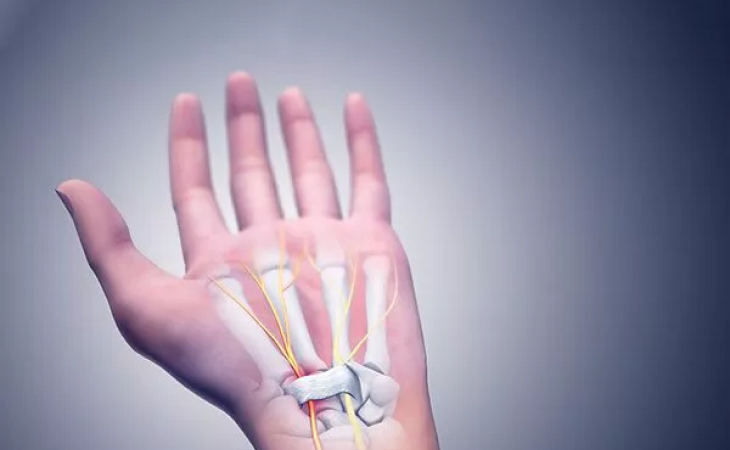
Carpel Tunnel Syndrome
Carpal tunnel syndrome is a condition in which the median nerve is compressed as it passes through an opening from the wrist to the hand called the carpal tunnel. The carpal tunnel is formed by the carpal bones on the bottom of the wrist and the transverse carpal ligament across the top of the wrist. Since the median nerve provides sensory and motor functions to the thumb and three middle fingers, many symptoms may result.
Facts about carpal tunnel syndrome:
According to the National Institute of Neurological Disorders and Stroke (NINDS), carpal tunnel release is one of the most common surgical procedures performed in the US. Women develop carpal tunnel syndrome three times more frequently than men. It usually occurs only in adults.
Causes carpal tunnel syndrome
Most cases of carpal tunnel syndrome have no specific cause, although any/all of the following may serve as a contributing factor:
-
frequent, repetitive, small movements with the hands (such as with typing or using a keyboard)
-
frequent, repetitive, grasping movements with the hands (such as with sports and certain physical activities)
-
joint or bone disease (i.e., arthritis, osteoarthritis, rheumatoid arthritis)
-
hormonal or metabolic changes (i.e., menopause, pregnancy, thyroid imbalance)
-
changes in blood-sugar levels (may be seen with type 2 diabetes)
-
other conditions or injuries of the wrist (i.e., strain, sprain, dislocation, break, or swelling and inflammation)
Symptoms of carpal tunnel syndrome
The following are the most common symptoms for carpal tunnel syndrome. However, each individual may experience symptoms differently. Symptoms may include:
-
difficulty making a fist
-
difficulty gripping objects with the hand(s)
-
pain and/or numbness in the hand(s)
-
“pins and needles” feeling in the fingers
-
swollen feeling in the fingers
-
burning or tingling in the fingers, especially the thumb and the index and middle fingers
-
pain and/or numbness that is worse at night, interrupting sleep
Diagnosis In addition to a complete medical history and physical examination, three medical associations agree that electrodiagnostic tests are the most accurate tool for diagnosing carpal tunnel syndrome. The American Academy of Neurology, the American Association of Electrodiagnostic Medicine, and the American Academy of Physical Medicine endorse a guideline that states that electrodiagnostic tests provide accurate diagnosis. Electrodiagnostic tests involve the stimulation of muscles and nerves in the hand.
Treatment of carpal tunnel syndrome:
Specific treatment for carpal tunnel syndrome will be determined by your physician based on:
-
your age, overall health, and medical history
-
extent of the disease
-
your tolerance for specific medications, procedures, or therapies
-
expectations for the course of the disease
-
your opinion or preference
Surgery for carpal tunnel syndrome
In general, the surgery for carpal tunnel syndrome is performed in an outpatient location under local or general anesthesia. The surgeon will make an incision in the wrist area. The tissue that is pressing on the nerves will then be cut, in order to decrease the pressure.
After the surgery, the wrist may be immobilized in a large dressing and wrist brace to help stabilize the area. The splint is usually worn continuously for the first two weeks after the surgery, but then is used intermittently for the next month or so. There is a moderate degree of pain in the hand after the surgery, which is usually controlled with pain medications taken orally. The surgeon may also have you keep the affected hand elevated while sleeping at night.
The length of recovery varies for each individual. If the nerve has been compressed for a long period of time, recovery may take longer. Movement of the fingers and wrists are encouraged a few days following surgery to help prevent stiffness
Treatment may include:
splinting of the hand (to help prevent wrist movement and decrease the compression of the nerves inside the tunnel)
oral or injected (into the carpal tunnel space) anti-inflammatory medications (to reduce the swelling)
surgery (to relieve compression on the nerves in the carpal tunnel)
changing position of a computer keyboard, or other ergonomic changes
Quick Contacts
Please feel free to contact us for any inquiry
- Emergency call : +91 94274 18181
- Email : contact@trishahospital.com
- Location: Trisha multispeciality hospital, Ahmedabad



